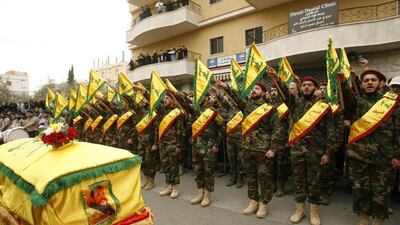Hizbollah has spilled blood with impunity for more than three decades. Rising to prominence by ruthlessly exploiting the grievances of ordinary people and skilfully filling the gaps in social services created by a state ravaged by Israeli occupation, it has tirelessly sought to turn Lebanon, the land of its birth, into a marionette of its paymaster, Iran. Despite its power, however, Hizbollah does not speak for Lebanon, which is a rich mosaic of multiple communities that yearn to be free of the toxic influence of Iran and its agents in their country’s affairs.
As these pages recently warned, the absence of awareness about Lebanon's complex communal reality permits self-serving powers such as Israel to portray the whole country, rather a single militia based inside it, as a threat. This is a pitfall that the US House of Representatives did well to avoid when it voted unanimously on Wednesday to pass a series of sanctions against Hizbollah. These sanctions, which must now be ratified by the US Senate before they are signed into law by President Donald Trump, are wide-ranging. They target Hizbollah's use of civilians as defensive shields, designating the practice as a war crime; reinforce measures introduced in 2015 to disrupt its finances, obliging the President to update Congress annually on the estimated worth of the militia's leaders, including its general secretary, Hassan Nasrallah; and, finally, they urge the European Union, which currently lists only the outfit's "military wing" as a terrorist entity, to blacklist all of Hizbollah as a terrorist organisation.s a rich mosaic of multiple communities that yearn to be free of the toxic influence of Iran and its agents in their country's affairs.
_________________
Read more
US House of Representatives unanimously passes sanctions on Hizbollah
Editorial: US policymakers need to tread carefully over the Lebanese situation
Israel's simplistic Hizbollah-Lebanese army narrative serves only to set a collision course
_________________
There is an implicit recognition in the three separate bills, which received bipartisan support, of the distinction between Hizbollah and Lebanon at large. Choking the former can only result in relief for the latter. The chief target of these sanctions, of course, is Iran – the wellspring of terror that is the focus of President Trump's revised security strategy for the Middle East. By refusing to re-certify the nuclear deal with Tehran, President Trump effectively put Congress on notice: either they come up with legislation to corral Iran, or he withdraws the US from the deal. Critics balked. But the tactic has yielded results. Congress has acted.
A fourth bill, scheduled to go to the floor on Thursday, is designed to curb Iran's ballistic missile programme, specifically to stop Tehran "from undertaking any activity related to nuclear-capable ballistic missiles". If passed, the legislation could have severe consequences for the Iranian Revolutionary Guards Corp, which has an outsize role in the development of Tehran's ballistic missiles. The nuclear deal was flawed from the beginning, its (practical) rewards for Iran wildly incommensurate with the (theoretical) concessions required of it. It has resulted in a richer and bolder Iran flexing its muscles across the region, literally handing bags of cash to Hizbollah. Legislation that can constrain and contain Tehran's overlords and their proxies can only be good for the Middle East and the wider world.

